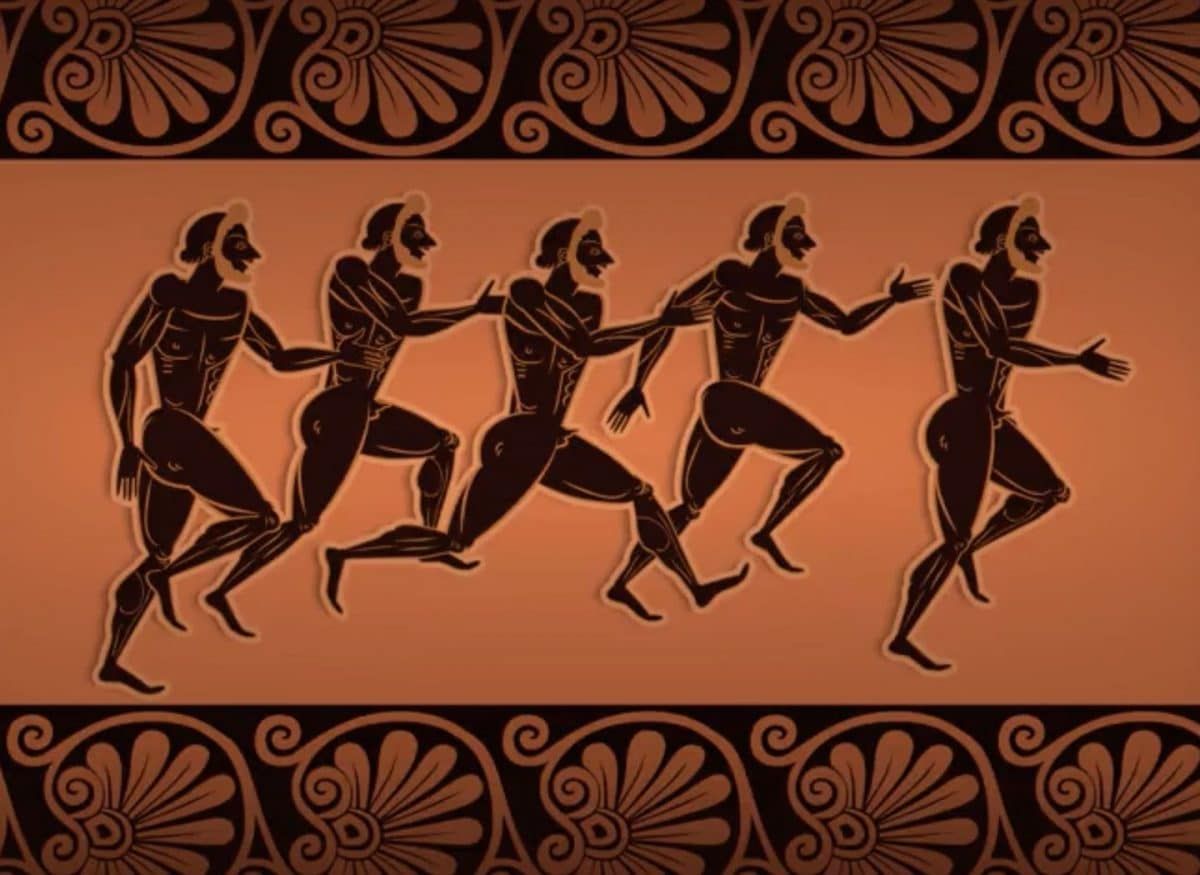At seventy-three years of age, the great and once-austere Kalanos sat unflinchingly on a raging pyre. “This body has grown old,” he had said. “It is becoming useless with each passing day. I no longer wish to lug it around.” Even with all the riches and comforts he had had due to the patronage of the Greek king Alexander, Kalanos had made up his mind. “Let Alexander know that I will meet him in Babylon,” he said in his last words. Exactly a year later, Alexander died in Babylon.
Kalanos was not some Greek philosopher as the name might imply; in fact, he could not be more Indian. Born in Taxila (or Takshsila), in erstwhile North India, present-day Pakistan, Kalanos was an ascetic known as Kalyana Rishi. 1
In 326 BCE, sent by Alexander, when Onesicritus met Kalanos for the first time, he lay stark naked on a rock. Naturally, the Greek minister dressed immaculately had grave doubts if the wisdom of Kalanos had been vastly overstated by his followers at the expense of veracity.
“I’ve come to discuss with you the deep truths of life,” Onesicritus said. “If I find them up to the mark, I will then take you to my king, Alexander the Great.”
The sage, however, did not so much as blink. Even when Onesicritus’s message was repeated twice more, Kalanos completely ignored him and his large entourage.
“Don’t you hear me?” Onesicritus shouted. “I have come to debate with you on philosophy.”
“Get off your horse then,” Kalanos said. “Strip down to nothing and come lie next to me.”
Onesicritus refused to do so and argued that what his clothes had got to do with anything, particularly philosophy.
“If you can’t take off the layers on your body, how will you remove the ones that cover your mind? And unless you strip your conditioned mind, how do you expect to have, hold, or create anything original? Don’t waste my time. Be gone.”
Legend has it that after much entreaty and persuasion by Alexander himself, Kalanos agreed to accompany him to Persia and live with him as his teacher.
“It intrigues me to this day,” Alexander contended a few months later, “that while what you said to Onesicritus was profound, what is wrong in wearing fine clothes?”
“I’m not against anything, much less, pleasures and fineries,” Kalanos, who dressed well and lived abundantly now, replied. “It’s just that clothes on most people aren’t the cloaks they use to cover their bodies. Instead, they are the layers of pride and entitlement. When Onesicritus first came, he was in his uniform. He came as a commander. Had he disrobed, he would appear a sore loser, a derelict homeless man shunned by society.”
Kalanos had a point. Dine at a plush restaurant dressed shabbily and see how you are looked upon by the staff and other patrons there.
Believe it or not, if I walk into any shiny showroom in my robes, the first thought in the shopkeeper’s mind, with contempt written all over his face, is that I’m some weirdo or a religious beggar who has come to solicit or seek alms. Most are unable to hide such thoughts and feelings. Particularly in India. Even if they share my religious beliefs, in fact, specifically when that is the case, they sneer at the whole situation because according to them had I been a true monk, I wouldn’t be shopping for, let’s say a laptop, an iPhone, or a good suitcase. Who knows, maybe they are right. Their respects are reserved for the guru locked in a little cabinet hanging on the wall just behind the cash counter. I don’t blame them, for we are all programmed to make sense of others and our surroundings based on numerous stereotypes. Forget me or my robes, you go ahead and try shopping in a branded place, while you speak in Hindi and are dressed traditionally, and see how you are served. In other words, you are routinely judged (and treated accordingly, at least in the first instance) based on what you wear.
To protect our respect and social honor, we often dress in not what is comfortable for us but what will appeal to a certain audience. In my mind, Kalanos was not a rebel who enjoyed uttering obscure or absurd things but a wise soul who cut through the hypocrisy of human existence.
And that is why when we get a seeker who wishes to devote his/her life to a different path, one of the first things that changes is what they can wear. Personally, I practice and am open to the idea of wearing what’s comfortable once you are ripe, rather than constantly attracting attention with your clothes or robes that stand out. In the beginning, however, this change is significant because when you wear robes you will be treated differently by different people. You will be openly ridiculed, judged, even reprimanded for your beliefs. You may be working very hard to pay your bills but it will be assumed that you are living off the charity of others. They will tell you what they think you can or can’t do in your life. These repeated episodes only bring home the realization that the material world can be a shallow and thoughtless place.
In fact, indifferent or disrespectful treatment is somewhat essential for personal spiritual growth. Reflect on the stories of Rosa Parks, Nelson Mandela, Mahatma Gandhi (Happy b’day, Mr. Gandhi!), Tulsidas, etc. There was a particular moment when they not only felt disrespected but so humiliated that it was enough to change the course of their lives and history.
At any rate, nothing pricks us like disrespect. A question we must ask though: who or what is it in us that feels angry, offended, and hurt when we are ignored or disrespected? Ego, hate, jealousy, false pride and rage, all come rushing to the fore like anxious creditors ambushing the administrator of a company in liquidation. Can you imagine? Out of the ten detriments to spiritual progress, 2 five come alive at the slightest feeling of disrespect. It shows a crack in the spiritual foundation of a sincere seeker.
Even for a moment, I’m not suggesting that we should intentionally invite disrepute or seek disrespect. You have the right to defend yourself and claim your place in the univer
I’ll go on to say that every time we desire respect, adulation, or praise, we slide back to an afflicted mind. Agreed that these things can give you a high, they can motivate us, they make us feel worthwhile, but my friend, in the grand scheme of things, they hold no meaning whatsoever.
A couple was visiting their hometown after many years when they thought of their old acquaintance, Mulla Nasrudin. Figuring it would be a good idea to pay him a visit, they bought some sweets and knocked on his door. Much to their shock, a completely naked Mulla opened the door. Not a thread on his body, except his turban. Even though the whole thing was awkward, it was too late to turn back.
“I am sorry,” Mulla said as he invited them in. “I’m not wearing anything because I wasn’t expecting any guests.”
“But why the turban then?” His friend asked.
“Just in case, someone does turn up, I thought…”
We all dress up for the world to earn their respect, approval, and praise. It’s all well and good, but it’s not necessarily required. It certainly is taxing. Respect for clothes?
What we label as respect is usually nothing more than polite talk by the other person when they feel that you can be of use to them. What is merely a social etiquette in 99% of the situations has become supremely important. Just think about it.
The good news is that it is possible to spiritually raise yourself to a level where you quietly assimilate into the world without being bothered by who thinks what of you. Their treatment of you won’t affect you much at all then. How, you ask? Ever been to tenpin bowling? When you gain the skill of holding and hurling the ball of mindfulness as it curls along the lane of consciousness, it will knock down the ten pins of afflictions. It may not happen every single time but with practice, it will happen more often than ever before.
It all begins with the awareness that seeking anything other than meaning in life may not be worth the sacrifice. Such awareness is then followed by the pledge of self-transformation. This is then reinforced by mindfulness. What is more important to you: respect or nirvana?
Give up the pursuit of respect and I promise you will be liberated in this very lifetime.
Peace.
Swami
P.S. If you like this write-up then all credit goes to Dr. Chandraprakash Dwivedi, a man I deeply respect for his beautiful brain and vast store of knowledge. I had the inspiration to write this post from this awesome talk (in Hindi) by him. (I only saw his bit: the first 24 min. Not sure about the remaining video.)
Notes
A GOOD STORY
There were four members in a household. Everybody, Somebody, Anybody and Nobody. A bill was overdue. Everybody thought Somebody would do it. Anybody could have done it but Nobody did it.
Don't leave empty-handed, consider contributing.It's a good thing to do today.









Comments & Discussion
332 COMMENTS
Please login to read members' comments and participate in the discussion.